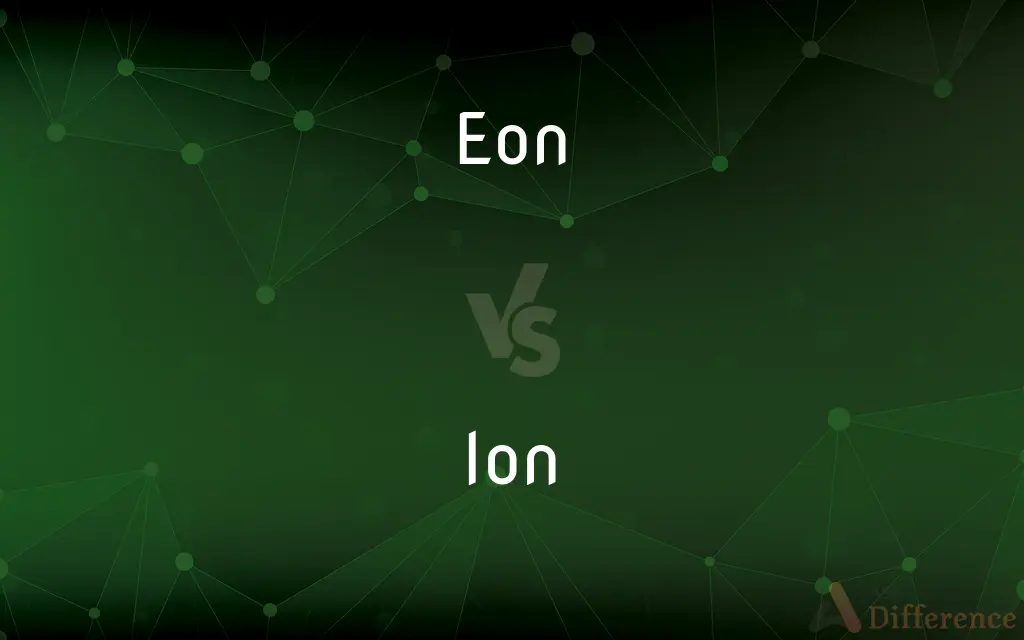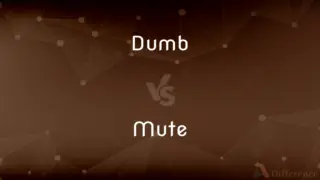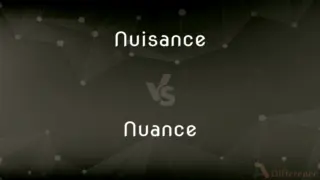Eon vs. Ion — What's the Difference?
By Urooj Arif & Maham Liaqat — Updated on April 19, 2024
An eon represents a vast, indefinite period in geological or cosmological time, often spanning billions of years; an ion is an atom or molecule with a net electric charge due to the loss or gain of electrons.

Difference Between Eon and Ion
Table of Contents
ADVERTISEMENT
Key Differences
An eon is one of the longest divisions of geological time, used in both geology and cosmology to denote periods extending over hundreds of millions to billions of years. On the other hand, an ion refers to an atom or molecule that has acquired a net electric charge by losing or gaining one or more electrons, affecting its chemical properties.
Eons are crucial for understanding the broad, historical progression of the Earth and the universe, encapsulating major changes and developments. Whereas ions are fundamental in the study of chemistry and physics, playing key roles in processes like electricity conduction and chemical reactions.
The concept of an eon highlights the vastness and gradual progression of natural history, from the formation of the Earth to the evolution of life and landscape. Conversely, ions illustrate the dynamic interactions at a microscopic scale that underpin much of what happens in both nature and technology.
In practical terms, eons are used by geologists and scientists to organize the timeline of Earth's history into manageable segments that reflect significant geological or biological events. In contrast, ions are manipulated in a variety of practical applications, including everything from everyday batteries to complex biochemical processes.
Culturally and scientifically, understanding eons helps contextualize the age and development of our planet, fostering a deeper appreciation of its past and future. On the other hand, understanding ions can lead to innovations in technology and medicine, demonstrating the practical impact of chemistry on modern life.
ADVERTISEMENT
Comparison Chart
Definition
A vast period of geological time.
An atom or molecule with a net electric charge.
Scale
Geological, spans millions to billions of years.
Microscopic, involves subatomic particles.
Importance
Helps understand Earth’s and the universe's broad history.
Crucial in chemical reactions and electrical technologies.
Usage
Organizes Earth's historical timeline.
Used in technology, chemistry, and physics applications.
Impact
Contextualizes long-term natural changes.
Influences everyday technology and biological functions.
Compare with Definitions
Eon
The largest division of geologic time, comprising two or more eras.
The Phanerozoic eon has witnessed the proliferation of life forms.
Ion
An atom or molecule with a net electric charge due to the loss or gain of electrons.
Sodium ions are crucial for nerve signal transmission.
Eon
Used to express a very long, unspecified period of time.
It's been eons since we last met.
Ion
Any charged species, cation or anion, involved in chemical reactions.
Calcium ions play a key role in muscle contractions.
Eon
A unit of time equal to a billion years, used in cosmology.
The universe is believed to be several eons old.
Ion
A particle that is electrically charged and found in the environment.
Air ionizers increase the concentration of ions in the air.
Eon
A long duration that seems endless.
Waiting for the verdict felt like an eon.
Ion
A charged particle in an electrolyte or plasma.
Ions move to the anode or cathode during electrolysis.
Eon
An indefinitely long period of time; an age.
Ion
A fundamental component in the study of atomic and molecular structures.
Ionization energy is measured to understand elemental properties.
Eon
The longest division of geologic time, containing two or more eras.
Ion
An ion () is a particle, atom or molecule with a net electrical charge. The charge of the electron is considered negative by convention.
Eon
(US) Eternity.
Ion
An atom or a group of atoms that has acquired a net electric charge by gaining or losing one or more electrons.
Eon
A period of 1,000,000,000 years.
Ion
An atom or group of atoms bearing an electrical charge, such as the sodium and chlorine atoms in a salt solution.
Eon
(geology) The longest geochronologic unit, being a period of hundreds of millions of years; subdivided into eras.
Ion
An atom or goup of atoms (radical) carrying an electrical charge. It is contrasted with neutral atoms or molecules, and free radicals. Certain compounds, such as sodium chloride, are composed of complementary ions in the solid (crystalline) as well as in solution. Others, notably acids such as hydrogen chloride, may occur as neutral molecules in the pure liquid or gas forms, and ionize almost completely in dilute aqueous solutions. In solutions (as in water) ions are frequently bound non-covalently with the molecules of solvent, and in that case are said to be solvated. According to the electrolytic dissociation theory, the molecules of electrolytes are divided into ions by water and other solvents. An ion consists of one or more atoms and carries one unit charges of electricity, 3.4 x 10-10 electrostatic units, or a multiple of this. Those which are positively electrified (hydrogen and the metals) are called cations; negative ions (hydroxyl and acidic atoms or groups) are called anions.
Eon
A long period of time.
It's been eons since we last saw each other.
Ion
One of the small electrified particles into which the molecules of a gas are broken up under the action of the electric current, of ultraviolet and certain other rays, and of high temperatures. To the properties and behavior of ions the phenomena of the electric discharge through rarefied gases and many other important effects are ascribed. At low pressures the negative ions appear to be electrons; the positive ions, atoms minus an electron. At ordinary pressures each ion seems to include also a number of attached molecules. Ions may be formed in a gas in various ways.
Eon
A spirit being emanating from the Godhead.
Ion
A particle that is electrically charged (positive or negative); an atom or molecule or group that has lost or gained one or more electrons
Eon
An immeasurable or infinite space of time; eternity; a long space of time; an age.
The eons of geological time.
Eon
One of the embodiments of the divine attributes of the Eternal Being.
Among the higher Æons are Mind, Reason, Power, Truth, and Life.
Eon
The longest division of geological time
Eon
An immeasurably long period of time
Eon
(Gnosticism) a divine power or nature emanating from the Supreme Being and playing various roles in the operation of the universe
Common Curiosities
What is an eon used for in science?
An eon is used to mark extensive periods in the geological timeline of Earth and the broader universe, helping scientists categorize and study major natural events over vast timescales.
How do ions function in the human body?
Ions play crucial roles in the human body, including transmitting nerve impulses, muscle contraction, and maintaining fluid balance.
Can an eon be precisely measured?
Eons are generally not measured precisely but are rather used to denote extensive, often somewhat indeterminate periods that span hundreds of millions to billions of years.
What are common uses of ions in technology?
Ions are used in various technologies, such as in batteries, electrolysis processes, and ion propulsion systems for spacecraft.
How does the concept of an eon relate to everyday life?
While the concept of an eon does not directly impact daily life, it provides a perspective on the extensive timeline of natural history, enhancing our understanding of Earth's past and future developments.
Can the length of an eon vary?
Yes, the length of an eon can vary depending on the geological and biological events that define its beginning and end.
What is ionization and why is it important?
Ionization is the process by which atoms gain or lose electrons to form ions, crucial for chemical reactions and in generating electricity in various applications.
What kind of scientific disciplines study eons?
Disciplines such as geology, paleontology, and cosmology study eons to understand the long-term processes and changes of the Earth and the universe.
How do ions affect electrical conductivity?
Ions contribute to electrical conductivity by moving and carrying charge in a solution or plasma, essential in processes like electrical transmission and electrolysis.
How do ions interact with magnetic fields?
Ions interact with magnetic fields due to their charge, which can be used to control or direct their path in applications like magnetic confinement in fusion reactors.
What are negative ions and their perceived benefits?
Negative ions are atoms or molecules that have gained electrons; they are often marketed for their supposed benefits in improving air quality and reducing stress, though scientific evidence varies.
How does ionization energy relate to ion stability?
Ionization energy can indicate how easily an atom becomes an ion; higher ionization energy generally means greater stability in the atomic state.
What is the significance of understanding eons in terms of environmental science?
Understanding eons helps environmental scientists gauge ecological and climate changes over geological times, aiding in predictions and conservation strategies.
Are there any technologies specifically designed to manipulate ions?
Yes, technologies such as ion engines, ion traps, and mass spectrometers are specifically designed to manipulate ions for various purposes.
What lessons can we learn from studying eons?
Studying eons teaches us about the resilience and adaptability of life, the impact of gradual geological changes, and the importance of viewing environmental changes in a long-term context.
Share Your Discovery

Previous Comparison
Dumb vs. Mute
Next Comparison
Nuisance vs. NuanceAuthor Spotlight
Written by
Urooj ArifUrooj is a skilled content writer at Ask Difference, known for her exceptional ability to simplify complex topics into engaging and informative content. With a passion for research and a flair for clear, concise writing, she consistently delivers articles that resonate with our diverse audience.
Co-written by
Maham Liaqat















































